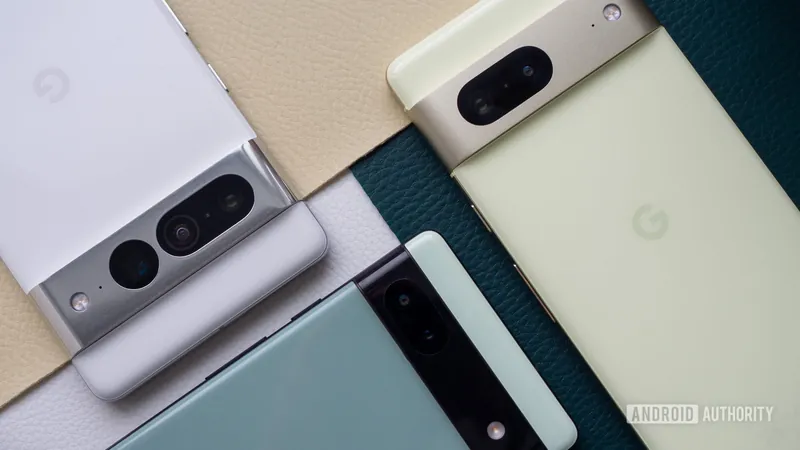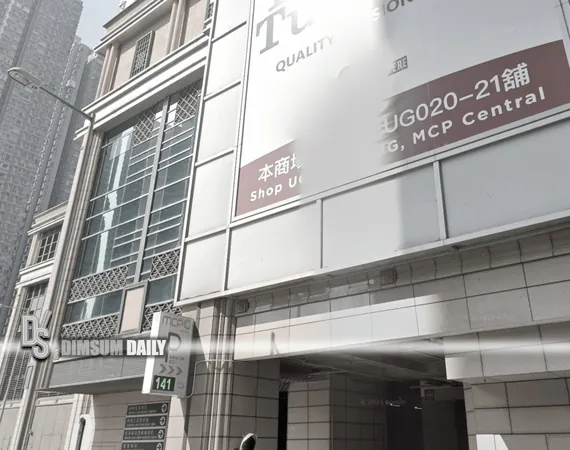
Google's Extended Pixel Updates: How Tensor Technology Redefines Longevity in Smartphones
2024-12-08
Author: Yan
Introduction
In a significant move for smartphone enthusiasts, Google has announced an extension of software support for its Pixel 6, Pixel 7, and Pixel Fold devices. This strategic update allows these models to receive OS upgrades until Android 17 and 18—an unexpected boon for users who might be considering an upgrade, despite their devices remaining fully capable.
Extended Support for Pixel Devices
Initially launched with Android 12, the Pixel 6 was set to receive three years of OS updates. This meant that 2023 would mark the end of major upgrades for the Pixel 6, aside from crucial security patches. Similarly, the Pixel 7 was on track to exhaust its update path next year, but now both devices will enjoy two additional years of upgrades, putting them at the forefront of update longevity in the Android ecosystem.
Industry Impact
This move not only benefits Google’s dedicated Pixel user base but also sets a precedent that puts pressure on competitors like ASUS. The revelation that a three-year-old Pixel phone could receive OS updates comparable to those offered to the latest flagship devices launched this year is telling about the industry's standards. Unfortunately for brands relying on traditional chipset manufacturers, reaching this level of support will be challenging.
The Role of Tensor Technology
So, what makes Google’s Tensor chip pivotal in this scenario? The secret lies in the close connection between OS updates and chipset hardware support. Unlike simply pushing software updates to devices, a solid hardware platform is essential for certification of Android updates. Prior to this development, manufacturers like MediaTek and Qualcomm could limit support based on software capabilities of their chipsets. However, Google’s in-house development of Tensor gives them autonomy over the entire process—from hardware fabrication to software updates.
Google Requirements Freeze (GRF) Program
In 2020, Google introduced the Google Requirements Freeze (GRF) program, relaxing previous constraints and allowing older chipsets to support new Android updates without the need for a complete overhaul of low-level hardware code. This means that chipsets released with Android 12 can still feasibly support Android 13, 14, and 15. Yet, while it extends support, new hardware features might remain inaccessible.
Competing Brands' Limitations
Interestingly, many rival brands that depend on MediaTek or Qualcomm chips face limitations on update policies dictated by their chipset vendors, typically capped at around four years. While some manufacturers are starting to incorporate longer support policies, they are often unequal to Google’s commitments.
Future Prospects of Google’s Support
By keeping control of the Tensor chip development, Google has outpaced its competitors in not only offering extensive updates for flagship devices but also for budget-friendly alternatives. This adaptability raises the question: how long will Google continue to support these devices? As cost dynamics change and user bases shrink, the future may not promise additional updates beyond what’s been recently announced.
The Longevity GRF Program
Furthermore, Google is spearheading a new initiative—the Longevity GRF program—which aims to expand Android OS update access for all manufacturers. This program allows for the reuse of chipset software up to seven years old when applying updates, potentially extending the lifecycle of upcoming smartphones. For instance, Qualcomm’s Snapdragon 8 Elite will utilize this new framework, ideally offering longer support than earlier chipsets.
Conclusion
While Tensor may receive criticism for not being the most advanced chip on the market, its strategic role in extending the Pixel series' update life makes it a significant player in the smartphone arena. As Google sets its sights on the Pixel 8 series—which promises an impressive seven-year update policy—the question remains: will Android competitors adapt to this new norm of extended support, or remain ensnared in antiquated update practices? Only time will tell, but for now, Tensor is proving invaluable in redefining what longevity means in the world of smartphones.



 Brasil (PT)
Brasil (PT)
 Canada (EN)
Canada (EN)
 Chile (ES)
Chile (ES)
 Česko (CS)
Česko (CS)
 대한민국 (KO)
대한민국 (KO)
 España (ES)
España (ES)
 France (FR)
France (FR)
 Hong Kong (EN)
Hong Kong (EN)
 Italia (IT)
Italia (IT)
 日本 (JA)
日本 (JA)
 Magyarország (HU)
Magyarország (HU)
 Norge (NO)
Norge (NO)
 Polska (PL)
Polska (PL)
 Schweiz (DE)
Schweiz (DE)
 Singapore (EN)
Singapore (EN)
 Sverige (SV)
Sverige (SV)
 Suomi (FI)
Suomi (FI)
 Türkiye (TR)
Türkiye (TR)
 الإمارات العربية المتحدة (AR)
الإمارات العربية المتحدة (AR)